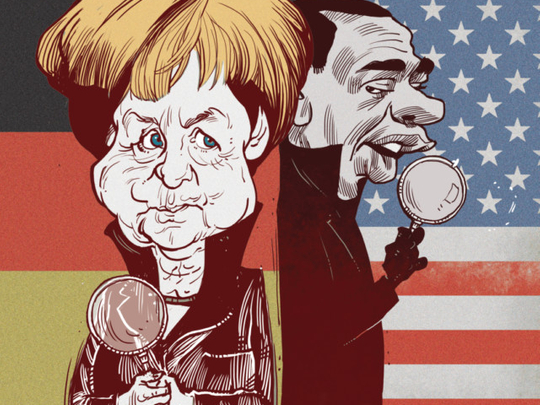
What did the president know and when did he know it? Such was demanded of Richard Nixon, who resigned 40 years ago. In no sense can US President Barack Obama be morally compared with the man who brought the US Watergate.
Obama is neither a crook nor a liar. But Obama shares one problem that can cripple what remains of his presidency — most people no longer trust him. The sentiment spans foreign allies as well as domestic critics. When trust goes, respect is seldom far behind.
The most surprising example is Germany. It was in Berlin in 2008 that then senator Obama had unveiled his global promise — an America that could once again be trusted. Germans no longer believe it. In the wake of the “friendly spying” ring allegations, less than 40 per cent of Germans consider the US a trustworthy partner, according to one survey.
Senior German figures cannot agree whether Obama was unaware of Washington’s double agents, or dissembling. Either way, when Obama spoke to the German Chancellor, Angela Merkel, the day before the initial revelations, he did not raise it. It was enough to make you want to cry, said Wolfgang Schauble, the Finance Minister. Never before has a close US ally expelled a CIA station chief.
Mistrust is a nebulous concept. In the case of Nixon, people rightly suspected he was crooked. In the case of Obama, it is based on the perception that he is ineffectual. His words are so rarely joined to deeds. The net result is not radically different.
When Obama promises something will happen — say a tightening of data surveillance safeguards or a drive to overhaul US immigration policy — people are no longer inclined to take him at his word. They may believe he means what he says. But they do not trust his ability to deliver.
There are Republicans who will swallow any number of preposterous stories about Obama — that he has used the Internal Revenue Service to hound conservatives or has plans to liquidate old people in order to control health care costs. But the conspiracy theorists have been around since the day he took office. What has changed is the mindset of ordinary people. Most Americans say they no longer personally trust Obama. And fewer than 30 per cent express trust in the office of the presidency.
Obama’s instinct has been to march away from the sound of gunfire. On the one hand, he has made it known that he hates being in Washington. From now on, Obama will take every opportunity to get out into the real world, say aides.
On the other, he blames the messenger for his predicament. Obama says he enjoys interacting with ordinary people, as opposed to the “cynics” who live in Washington, including the US media. The word now crops up in nearly every speech. “It’s easy to be cynical, in fact these days it’s kind of trendy,” he said. “Cynicism is a choice and hope is a better choice.”
Journalism has more than its fair share of cynics, but most reporters are better described as sceptical. A cynic believes there is nothing new under the sun. A sceptic resists gullibility. On the basis of the latter, Obama does not appear to relish being chief executive.
According to Mark Knoller, who chronicles the habits of US presidents, Obama has now played golf 179 times — considerably more than George W. Bush, his golf-loving predecessor. Obama dislikes spending time with fellow politicians, but he seems happy to attend endless fundraisers.
He has now clocked up 393 fundraising events since becoming president, almost double that of Bush. If Obama puts half as much effort into co-opting or wrongfooting his opponents as he does raising cash from the wealthy, people may be less sceptical.
It is not only journalists who remember Obama’s promise in 2008 to limit his spending to public funding on condition that his Republican opponent agreed to do the same. Sure enough, his opponent (John McCain) accepted the deal. By then, Obama had discovered his great flair for raising money. He dropped the offer.
Nixon’s aides were caught laundering illegal campaign funds and imprisoned for it. Obama’s methods are legal and transparent. They are like night and day, but nobody expected better from “Tricky Dicky”. Obama, on the other hand, made large ethical claims — that he would change the tone in Washington, that he would restore America’s moral authority in the world and that he would drive big money out of politics.
If you seek an explanation for why Obama riles so many voters — and not just Tea Party conservatives — the perception of double standards is at the root of the problem. Leaders who make grand moral promises set themselves up for a fall. If they cannot live up to them, the backlash is all the greater.
That is why Obama is so often compared to Jimmy Carter. For all his turpitude, Nixon was good at working the machinery of state to get things done, some of them very impressive. Even when they disagree, people want action from their leaders, rather than explanations for inaction. Nixon’s actions were sometimes heinous. Obama’s are often innocuous.
“When the president does it, that means that it is not illegal,” Nixon told David Frost. “If I do something, it is moral,” Obama appears to believe. Except when it is not moral, which brings on greater disillusion. Call it Obama’s Germany syndrome.
Financial Times










